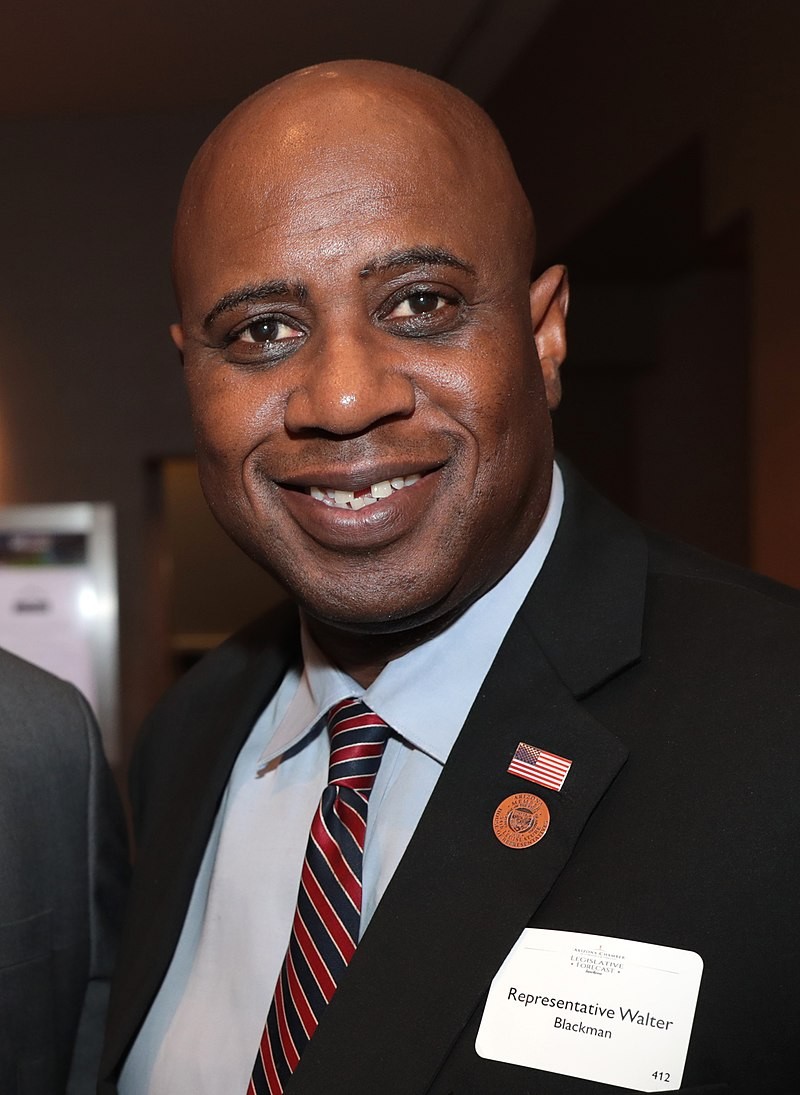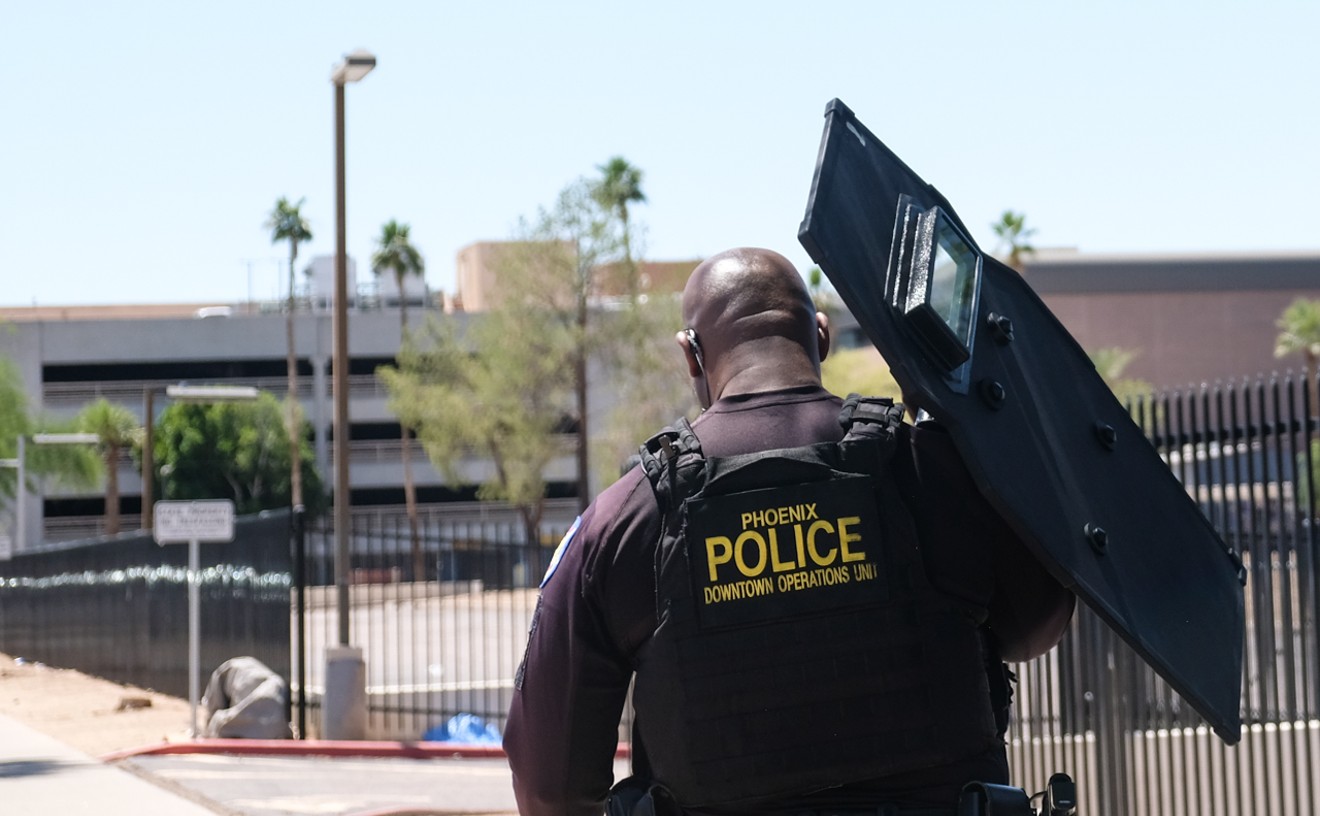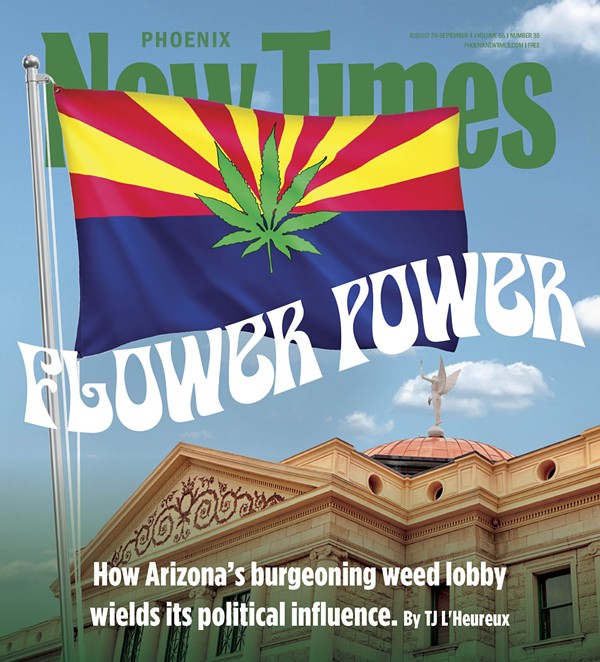Republican Representative Walter Blackman introduced a bill today that, if passed, would be the most sweeping sentence reform for nonviolent offenders in Arizona since 1994.
The bill would make nonviolent offenders eligible for reduced sentences if they participate in rehabilitative programming. It would also require corrections departments to study the recidivism rates of people released early under the program.
Though potentially groundbreaking, it’s a more moderate bill than the lawmaker’s attempt last year to amend the existing earned release credits system, which allows prisoners to earn time off for “good time” served.
House Bill 2808 would increase the amount of earned release credits nonviolent offenders can accrue through participation in drug treatment or a “major self-improvement program” while incarcerated.
In addition to the one day off for each six days served prisoners currently earn, eligible nonviolent offenders who participate in this rehabilitative programming will earn an additional day-and-a-half off their sentences for every six days served — a 30 percent reduction in their original sentencing time.
In 1993, during the peak of the nation’s “tough on crime” era, Arizona passed truth-in-sentencing laws that eliminated parole for anyone sentenced after Jan. 1, 1994. Since then, Arizona has required nonviolent offenders to serve 85 percent of their sentences — one of only three states in the country to do so.
But last year, a bill known as SB 1310, sponsored by Republican State Senator Eddie Farnsworth, passed into law. It has the same reduced sentencing framework as Blackman’s proposed bill, with prisoners only required to serve 70 percent should they participate in programming. But the bill is limited, applying only to people incarcerated for drug possession offenses.
“This just really builds upon that bill by expanding it to the entire nonviolent population,” said Lauren Krisai, senior policy analyst for Justice Action Network, a bipartisan criminal justice reform coalition that frequently works in states like Arizona.
The same year that Farnsworth’s bill moved through the Legislature and eventually passed, Blackman proposed House Bill 2270, which would have dramatically reduced the amount of time certain populations would have been required to serve out their sentence. Under it, nonviolent offenders could earn one day for every day served, and those convicted of a dangerous offense could earn one day for every three days served.
The bill never received a hearing.
Blackman’s new proposal applies only to nonviolent offenders, reducing the amount they could earn to a maximum of two-and-a-half days for every six served, and requiring them to participate in programming before becoming eligible for these additional credits.
“People respond to incentives,” said Molly Gill, vice president of policy at Families Against Mandatory Minimums, a nonprofit sentencing reform organization in Washington, D.C. “People in prison aren’t necessarily going to do the hard work of becoming sober, or earning a degree, or learning a new job trade, if there’s nothing in it for them. If we really care about people improving themselves in prison, which we should, we need to get them some incentives that are going to matter.”
The proposed legislation comes after a half-year of study by a bipartisan house committee known as the Earned Release Credits For Prisoners Ad Hoc Committee, which Blackman chaired from June to December 2019, and which gathered recommendations from stakeholders on how to expand the existing earned release program.
Like Farnsworth's legislation, the bill would apply to the current prison population.
But Blackman said it will not be entirely retroactive — it’s a bit more complicated than that. Instead, they will determine, alongside the Department of Corrections, if the programs prisoners have previously participated in apply to the proposed earned release credits program and its model of rehabilitation.
“We’re just only applying retroactively the programs that apply to the underlying needs, or issues, that led them to prison,” said Blackman. “For example, a habitual drug user, if they’re taking the classes that we already laid out in the legislation, those classes will count. We’re going to look at what you’ve done, how you’ve progressed, and look at if those credits count [for the new ratio].”
This calculation will take place after the bill passes and the program begins. The legislator compared it to transferring from one university to another.
“The relevant credits still apply, and you just might still have to take English 400 to graduate,” said Blackman.
“Certainly, we would like to see more done in Arizona, but when we put it in the context of where the state is, I think this is a good first step for lawmakers,” said Krisai, who provided guidance during the study. “I think you can build upon this in the future.”
The bill does not include a specific provision for inmates employed by the state as firefighters, something Blackman previously spoke about wanting to introduce this legislative session. Incarcerated firefighters from Florence Prison and their family members have been writing to the representative since July, requesting a bill that would allow them to earn a day off their sentence for every two days served out in the field.
Because firefighting prisoners must have committed low-level offenses to qualify for the program, this population nevertheless qualifies for the increased two-and-a-half-to-six ratio included in this more general proposal.
Blackman also said the firefighters are the exception to his claim that the bill is not retroactive — every hour a prisoner has spent in the wildland firefighters' program will automatically be calculated under the new ratio.
“They’re in a different category,” said Blackman. “They’re so far along in the programming that the firefighters may be the first ones to walk out.”
“I think there are certainly going to be people who say this bill doesn’t go far enough,” said Gill of FAMM. “But the thing that we experience at our organization is that every day counts when you’re waiting on a loved one to come home. I think for those who are helped, it’s going to mean a lot. For those who aren’t, it’s going to be frustrating.
“But I think we need to be moving in this direction. What we want is for everybody to get the rehabilitation that they need, so that they don’t go back to the prison.”
The bill would also require the Department of Corrections to conduct annual studies of the recidivism rates of prisoners released under the program for a minimum of three years after their release.
The Department of Corrections does not comment on proposed legislation.
"I am thankful for everyone's help on HB2808," Blackman told New Times, "and I look forward to positive dialogue from my colleagues concerning this important issue."

Audio By Carbonatix
[
{
"name": "Air - MediumRectangle - Inline Content - Mobile Display Size",
"component": "18478561",
"insertPoint": "2",
"requiredCountToDisplay": "2",
"watchElement": ".fdn-content-body",
"astAdList": [
{
"adType": "rectangle",
"displayTargets": "mobile"
}
]
},{
"name": "Editor Picks",
"component": "16759093",
"insertPoint": "4",
"requiredCountToDisplay": "1",
"watchElement": ".fdn-content-body",
"astAdList": [
{
"adType": "rectangle",
"displayTargets": "desktop|tablet"
},{
"adType": "rectangle",
"displayTargets": "desktop|tablet|mobile"
}
]
},{
"name": "Inline Links",
"component": "17980324",
"insertPoint": "8th",
"startingPoint": 8,
"requiredCountToDisplay": "7",
"maxInsertions": 25
},{
"name": "Air - MediumRectangle - Combo - Inline Content",
"component": "16759092",
"insertPoint": "8th",
"startingPoint": 8,
"requiredCountToDisplay": "7",
"maxInsertions": 25,
"watchElement": ".fdn-content-body",
"astAdList": [
{
"adType": "rectangle",
"displayTargets": "desktop|tablet"
},{
"adType": "rectangle",
"displayTargets": "desktop|tablet|mobile"
}
]
},{
"name": "Inline Links",
"component": "17980324",
"insertPoint": "8th",
"startingPoint": 12,
"requiredCountToDisplay": "11",
"maxInsertions": 24
},{
"name": "Air - Leaderboard Tower - Combo - Inline Content",
"component": "16759094",
"insertPoint": "8th",
"startingPoint": 12,
"requiredCountToDisplay": "11",
"maxInsertions": 24,
"watchElement": ".fdn-content-body",
"astAdList": [
{
"adType": "leaderboardInlineContent",
"displayTargets": "desktop|tablet"
},{
"adType": "tower",
"displayTargets": "mobile"
}
]
}
]











